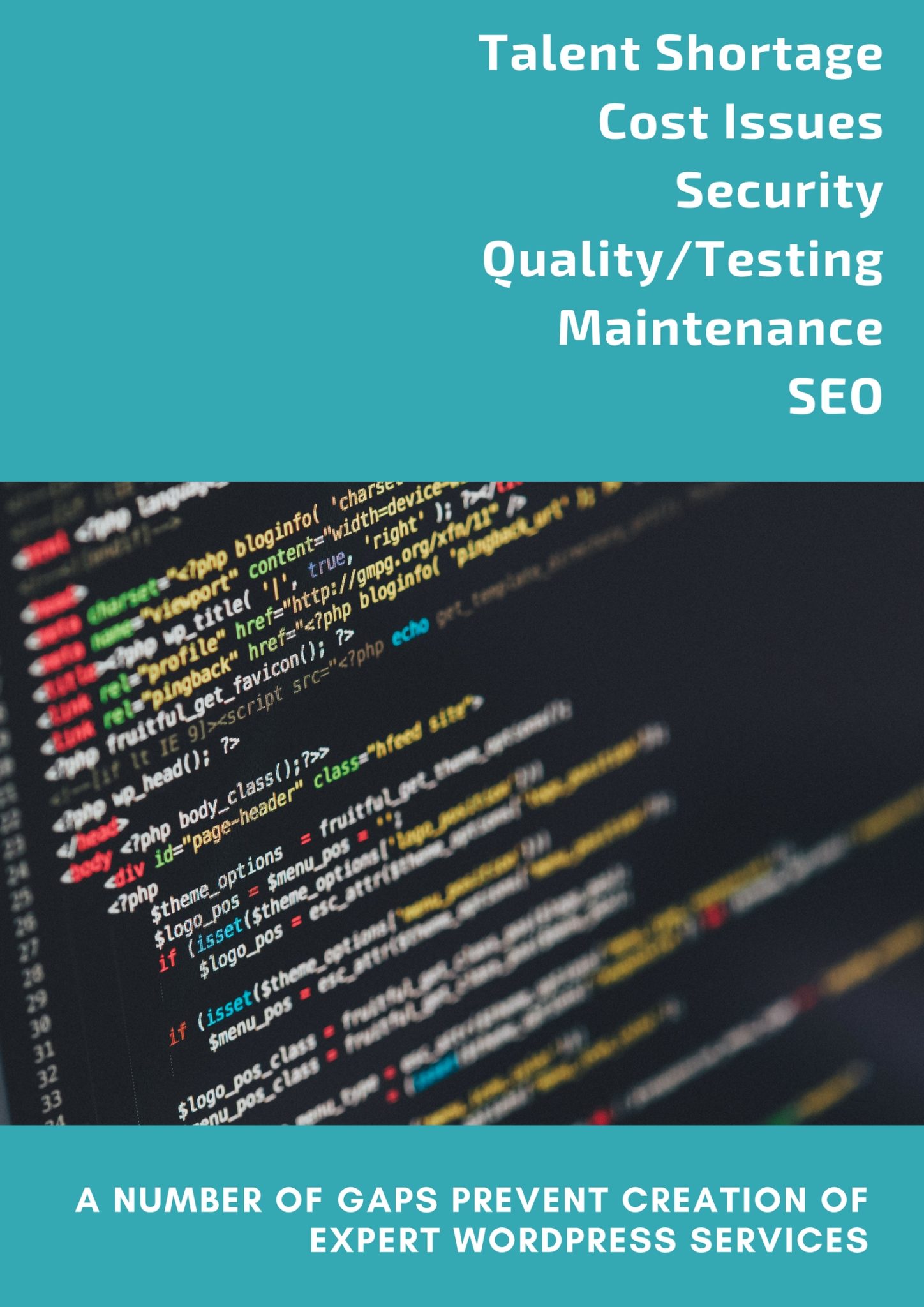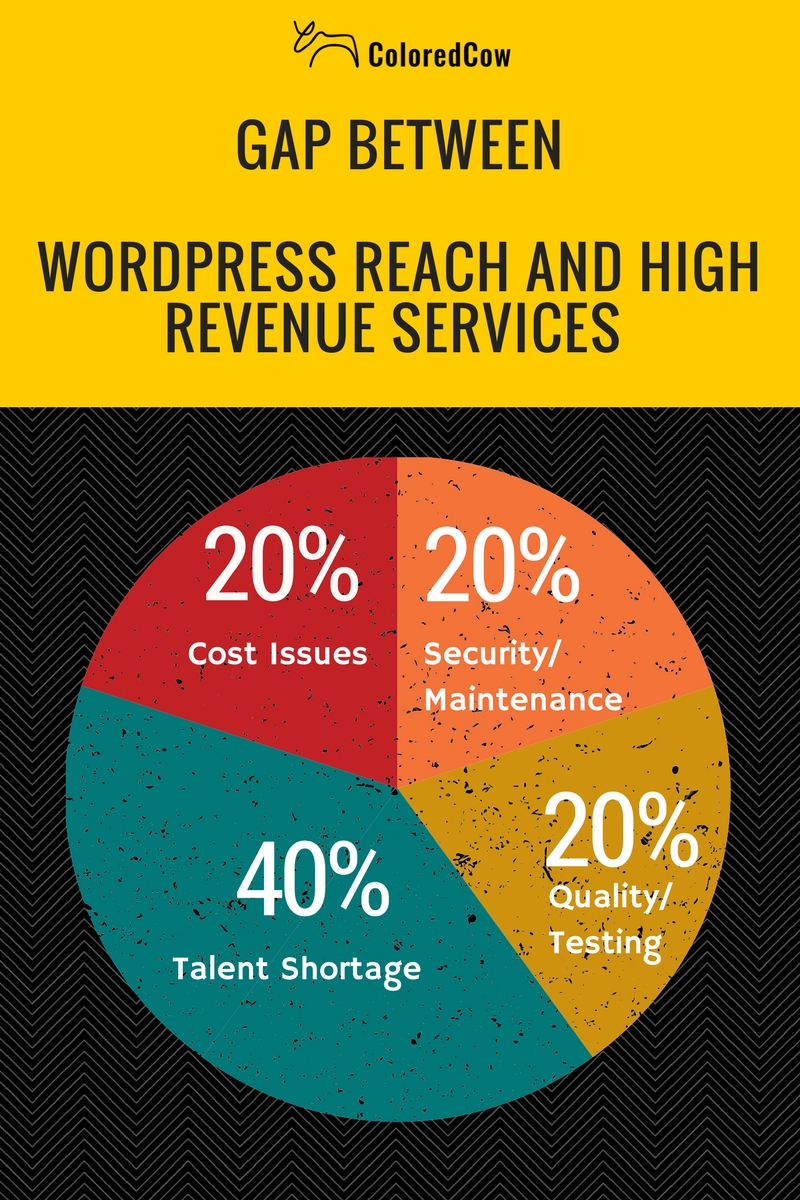May 2, 2017
WordPress in recent times has become a hugely popular platform to build a variety of web apps. It started off as a simple blogging platform but very soon evolved into a lot of different dimensions. With recent updates, we now have support for API developments in as well. Currently, more than 30% of the internet websites and portals are made in WordPress and the number continues to climb.
WordPress caters to a multi dollar economy but ironically WordPress service industry has never been able to bloom high in terms of revenue. A number of gaps prevent the creation of expert WordPress services.
Talent Shortage
Talent has been an issue in the WordPress industry for a long period of time and has been growing ever since. This has been primarily due to two reasons
- The seemingly easy to use dashboard and easy to extend core functionalities has given rise to a new kind of developer force. Increasing number of people claiming to be developer, whose scope of work is limited to-
- Installing WordPress core on the cheapest shared hosting service available.
- Using available themes and plugins to setup a website.
- Performing marginal tweaks to HTML/CSS/JavaScript of the website to provide a hack for some feature requested by the clients.
- Managing website from DashBoard.
- Actual developers with experience of building software and exposure of multiple frameworks leaving WordPress development. This has been due to poor monetary benefits as a result of pseudo developers offering development services. That too for an insignificant amount of money.
All this boils down to a very small stream of developers who actually meet the claims that they offer with regards to WordPress. Sometimes, people who consider themselves experts in the fields are misinformed too. Experts in PHP sometimes assume that their expertise will translate into the WordPress domain knowledge as well. However, as the project expands to a more framework specific architecture and components, it quickly translates into a module made up of fixes and hacks. This, in turn, affects the platforms performance, security, and stability.
Cost Issues
The easy to use, robust design and architecture of WordPress have also given way to another problem. People (read customers) have started to assume that a WordPress project will naturally come cheap. The companies building custom projects overcharge. And the solutions delivered by them is identical to the one delivered by a freelancer or small organizations building websites for $500. This ideology has been spread by the availability of free/cheap themes and plugins. These are usually built by hobby programmer or small/inexperienced organizations. They have no obligation towards making the components follow the WordPress coding standards. They also are not required to ensure that they are no potential security loopholes. Or if there are no performance setbacks for the platforms in which they are installed.
Security
There has been a general notion among general folks that WordPress projects have security issues and are vulnerable to hacking. However, it is important to understand that WordPress powers more than 30% of the internet web-applications and its core is extremely secure. A lot of things go hand in hand to make up for a secure working real time project. A car with the best in class security and drive feature, is meant to crash if run to totally worn out tires. Similarly, the highly secure WordPress core is of no use when attached to plugins with massive security loopholes. Or when installed on a vulnerable (read cheapest) hosting service available. As a method of cost cutting, many times there are no disaster recovery plans in place. Most of the websites run even without any database backup and recovery plan.
Quality / Testing
The quality of WordPress projects has also been in question for a lot of people. Due to the mass availability of WordPress developers on the fly, the quality of projects has taken a serious hit. With people inexperienced people meddling into the software development via WordPress, somehow the notion of these projects not needing traditional software development procedures has gone out. This is evident by the absence of testing in WordPress related discussions. While the whole software world is transitioning and moving towards Test Driven Development, unit tests seems a far off thing in WordPress. Testing ensures quality and security, which is the smallest concern for people looking for the cheapest solution to get the project online.
Maintenance
Maintenance of WordPress projects has also been a challenge for customers. These can span from changing a dashboard setting or updating a plugin to complete restructuring of components and developing a custom application on top of WordPress core. They can be a simple blog to a complete web application with many integrations. Though building them is a challenge in itself, maintaining them sometimes is a nightmare. Many of the WordPress projects are built by cheap developers or freelancers. This ensures that there are almost no software development methodologies followed. Also, the documentation is virtually absent. All this combines into a nightmare for the developers/organization performing maintenance on these projects.
SEO
Most of the WordPress applications are web projects that have been initiated as a marketing assistance tool for the organization. SEO of the project in that cases is of paramount importance. While WordPress itself is optimized in accordance with the best SEO practices, the Themes and plugins play a very vital role in the SEO performance of the web projects. The free themes that are available all around all claim to be optimized for SEO. However, as with security, these plugin developers don’t have any obligation to ensure that their themes are optimized as they claim to be. In some cases, due to the bad practices, they even negatively affect the SEO of the project.
In order, to get expert services both the customers and the service providers have to be more aware. As a lot of customers are not very informed about the technology front, they easily make preferences based on the cost charged. But on a longer run with an inefficient solution end up spending far more than that. The people in the current service industry who do not take WordPress projects very seriously also need to understand the importance of applying WordPress Standards and Good Coding Practices then only collectively everyone can work on making WordPress not just a high reach platform but also a high revenue one.


